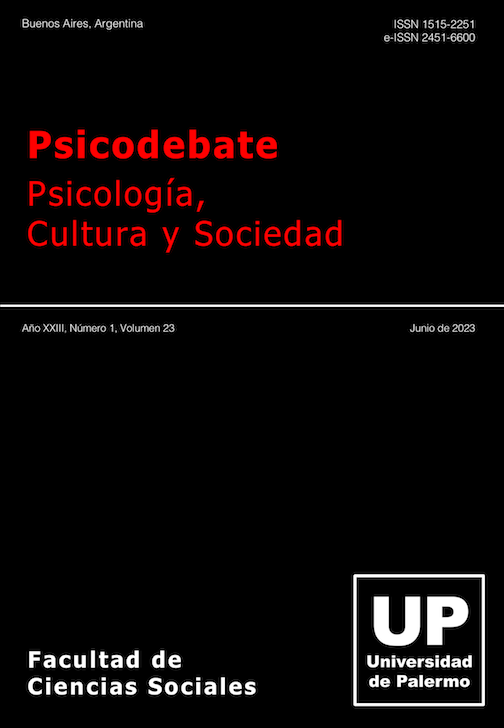Patterns of Friendship: Structure, Psychological Well-Being and Social and Emotional Loneliness
Abstract
The study aimed to analyze the patterns of friendship groups among Argentinian young adults in terms of structure, homogeneity and certain social and individual characteristics, and its relation with psychological well-being and social and emotional loneliness. The research is quantitative, descriptive, non-experimental and cross-sectional with a múltiple holistic case design. The sample comprises 6 friendship groups of young adults (5 female and 1 male) with a mean age of 24.73 (SD = 2.44, Min = 20, Max = 30). The results show structural differences between groups around the figure of authority position or hub, and an average tendency towards homogeneity that implies differences between the groups related to the number of members. Psychological well-being show high levels and loneliness low levels; while both variables are associate with group characteristics such as homogeneity and the number of members. The group organization forms are differentiate by social and individual characteristics such as marital status, family occupation, residence and social class. Positive feelings are associate with membership and not with positional differences.
Downloads
References
Baghino, D., & Corteletti, L. (2021). Satisfacción vital y felicidad en primera y segunda ola de la pandemia por COVID-19. Anuario de Investigaciones, XXVIII, 339-346.
Bliezner, R., & Adams, R. (1992). An Integrative Model of Friendship. En C. Hendrick y S. Hendrick. (Eds.) Sage series on Close Relationships. Adult Friendship (pp. 1-27). SAGE Publications, Inc. https://doi.org/10.4135/9781483325675.n1
Brands, R. (2013). Cognitive social structures in social network research: A review. Journal of Organizational Behavior, 34, S82-S103. https://doi.org/10.1002/job.1890
Fehr, B. (1996). Achieving Closeness. En C. Hendrick y S. Hendrick (Eds.), Sage series on close relationships. Friendship processes (pp. 70-112). SAGE Publications, Inc. https://doi.org/10.4135/9781483327440
Fernández, O., Muratori, M., & Zubieta, E. (2013). Bienestar eudeamónico y soledad social y emocional. Boletín de Psicología, 108, 7-23.
Gutiérrez-Carmona, A., & Urzúa, A. (2019). ¿Los valores culturales afectan el bienestar humano? Evidencias desde los reportes de investigación. Universitas Psychologica, 18(1), 1-12. https://doi.org/10.11144/Javeriana.upsy18-1.vcab
Krackhardt, D. (1987). Cognitive social structures. Social Networks, 9, 109-134. https://doi.org/10.1016/0378-8733(87)90009-8
McIntyre, J. C., Worsley, J., Corcoran, R., Harrison Woods, P., & Bentall, R. P. (2018). Academic and non-academic predictors of student psychological distress: the role of social identity and loneliness. Journal of Mental Health, 27(3), 230-239. https://doi.org/10.1080/09638237.2018.1437608
Morrow, J., & Jackson, A. (1993) How “Significant” is Your Reliability? Research Quartely for Exercise and Sport, 64(3), 352-355. https://doi.org/10.1080/02701367.1993.10608821
Muratori, M., Delfino, G., & Zubieta, E. (2012), Sucesos vitales y bienestar. Anuario de Investigaciones, XIX, 49-57.
Páez, D., & Zubieta, E. (2002) Psicología social, salud, apoyo social y aspectos ambientales. En J. F. Morales, D. Páez, A. Kornblit & D. Asún (Eds.), Psicología Social (pp. 405-421). Pearson Education S.A.
Parker, P., Ciarrochi, J., Heaven, P., Marshall, S., Sahdra, B., & Kiuru, N. (2014). Hope, Friends, and Subjective Well-Being: A Social Network Approach to Peer Group Contextual Effects. Child Development, 86(2), 1-9. https://doi.org/10.1111/cdev.12308
Perlman, D., & Peplau, L. A. (1998). Loneliness. En H. S. Friedman (Ed.), Encyclopedia of mental health, Vol. 2 (pp. 571-581). Academic Press.
R Core Team (2021). R: A language and environment for statistical computing. R Foundation for Statistical Computing.
Rawlins, W. (2017). Foreword. En M. Hojjat & A. Moyer (Eds.), The Psychology of Friendship. (pp. ix-xiv). Oxford University Press.
Rupnik, J. (2014). Finding community structure in social network analysis-overview. https://ailab.ijs.si/dunja/SiKDD2006/Papers/Rupnik.pdf
Ryff, C. (1989). Happiness is everything, or is it? Explorations on the meaning of psychological well-being. Journal of Personality and Social Psychology, 57, 1069-1081. https://doi.org/10.1037/0022-3514.57.6.1069
Shaver, P. R., & Brennan, K. A. (1991). Measures of depression and Loneliness. En J. P. Robinson, P. R. Shaver & L. S. Wrightsman (Eds.), Measures of Personality and Social Psychological Attitudes (pp. 195-289). Academic Press. https://doi.org/10.1016/B978-0-12-590241-0.50010-1
Simmel, G. (1950). The Sociology of Georg Simmel. Free Press.
Weiss, R. S. (1973). Loneliness: The experience of emotional and social isolation. MIT Press.
Wrzus, C., Zimmermann, J., Mund, M., & Neyer, F. (2017). Friendships in Young and Middle adulthood. Normative Patterns and Personality Differences. En M. Hojjat & A. Moyer (Eds.), The Psychology of Friendship. (pp. ix-xiv). Oxford University Press. https://doi.org/10.1093/acprof:oso/9780190222024.003.0002
Zubieta, E., Sosa, F., Muratori, M. & Freiberg, A. (2023). Validación de la Escala de Bienestar Psicológico de Ryff en una muestra argentina (Manuscrito en preparación).
Zubieta, E., Muratori, M., & Fernández, O. (2012). Bienestar subjetivo y psicosocial: explorando diferencias de género. Salud & Sociedad, 3(1), 66-76. https://doi.org/10.22199/S07187475.2012.0001.00005
Copyright (c) 2023 Psicodebate

This work is licensed under a Creative Commons Attribution 4.0 International License.
Authors who publish with this journal agree to grant Psicodebate copyright and right of publication and accept the work being licensed under a Creative Commons Attribution License that allows others to share the work with an acknowledgement of the authors and Psicodebate.

















